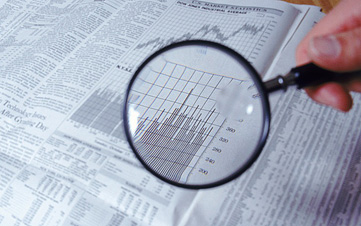How to Be a Better Fund Investor
Yes, we live in trying times, and investors should be concerned about a feeble economy and volatile, often irrational markets.


Profit and prosper with the best of Kiplinger's advice on investing, taxes, retirement, personal finance and much more. Delivered daily. Enter your email in the box and click Sign Me Up.
You are now subscribed
Your newsletter sign-up was successful
Want to add more newsletters?

Delivered daily
Kiplinger Today
Profit and prosper with the best of Kiplinger's advice on investing, taxes, retirement, personal finance and much more delivered daily. Smart money moves start here.

Sent five days a week
Kiplinger A Step Ahead
Get practical help to make better financial decisions in your everyday life, from spending to savings on top deals.

Delivered daily
Kiplinger Closing Bell
Get today's biggest financial and investing headlines delivered to your inbox every day the U.S. stock market is open.

Sent twice a week
Kiplinger Adviser Intel
Financial pros across the country share best practices and fresh tactics to preserve and grow your wealth.

Delivered weekly
Kiplinger Tax Tips
Trim your federal and state tax bills with practical tax-planning and tax-cutting strategies.

Sent twice a week
Kiplinger Retirement Tips
Your twice-a-week guide to planning and enjoying a financially secure and richly rewarding retirement

Sent bimonthly.
Kiplinger Adviser Angle
Insights for advisers, wealth managers and other financial professionals.

Sent twice a week
Kiplinger Investing Weekly
Your twice-a-week roundup of promising stocks, funds, companies and industries you should consider, ones you should avoid, and why.

Sent weekly for six weeks
Kiplinger Invest for Retirement
Your step-by-step six-part series on how to invest for retirement, from devising a successful strategy to exactly which investments to choose.
Yes, we live in trying times, and investors should be concerned about a feeble economy and volatile, often irrational markets. But now more than ever, we need to shunt aside emotions and approach our investments with logic and detachment, and take a long-term view. By understanding the fundamentals of fund investing -- knowing how to buy and when to sell -- you can be a better investor in any market.

How to Buy: Get the Right Fund for Your Goals
Funds come in a number of broad categories -- stocks, bonds, money markets, hybrids and alternative investments, such as commodities. Each category is subdivided into more-specific groups -- for example, stock funds may focus on small U.S. companies or large foreign firms. In general, the more a fund is oriented toward stocks, the riskier it is and the greater the potential for reward.

How to Buy: Check the Record
Look at long-term results -- at least five years’ worth, preferably ten. Compare the record with a benchmark and the category average. Be wary of an advertising claim that a fund beat this index or that peer group over the past one, three, five and ten years. One recent blockbuster year can skew that kind of analysis. And check to see that the same manager was in place over the entire period.

How to Buy: Keep Costs Down
Fees eat away at your returns. Put $10,000 in a fund that grosses 10% yearly and charges 1.5% in fees and you’ll have $49,725 after 20 years. But if the fund charges 0.5% a year, you’ll have $60,858. Compare a fund’s fees with those of other funds in the same category. The average annual fee for diversified U.S. stock funds is 1.32%, for example. Avoid sales charges, too.

How to Buy: Make Sure You Can Live with a Fund’s Risk
Generally, the greater a fund’s volatility, the greater its potential reward. Be sure a fund’s returns have been commensurate with its risks and that you can sit through the inevitable downdrafts without flinching. A big problem with high-risk funds is that they attract many investors after they soar. Those investors then sell after the fund craters.

When to Sell: Your Manager Splits
If you own an actively managed fund, the person or group of people in charge is key. This is especially true at smaller firms that are intimately tied to one manager, such as Yacktman Fund and Don Yacktman. It’s less important at large companies with deep benches, such as Fidelity and T. Rowe Price. A manager’s departure shouldn’t be an automatic trigger to dump a fund, but it should raise a red flag.


When to Sell: The Fund Changes Its Stripes
Those small-capitalization stocks a fund bought years ago may have graduated to mid-cap or even large-cap status.
Or a manager may have made a conscious decision to shift the fund’s focus. For example, Fairholme Fund morphed over the past year into something akin to a financial-sector fund.
So check out a fund’s current investment style at Morningstar.com, with an eye toward how it fits in with your portfolio. If a fund is no longer a good fit, consider selling.

When to Sell: Assets Explode
The bigger a fund, the less nimble. This is especially problematic for small-cap stock funds -- as the fund trades shares, it may move the stock price in a way that hurts results. But asset bloat can hinder large-cap funds, too. Fidelity Magellan posted stunning gains in the early ’80s, but performance started to peter out as assets surged.

More from Kiplinger
SPECIAL REPORT: Be a Better Investor
Build a Better Portfolio
Kiplinger's Guide to Investor Psychology
Profit and prosper with the best of Kiplinger's advice on investing, taxes, retirement, personal finance and much more. Delivered daily. Enter your email in the box and click Sign Me Up.

Nellie joined Kiplinger in August 2011 after a seven-year stint in Hong Kong. There, she worked for the Wall Street Journal Asia, where as lifestyle editor, she launched and edited Scene Asia, an online guide to food, wine, entertainment and the arts in Asia. Prior to that, she was an editor at Weekend Journal, the Friday lifestyle section of the Wall Street Journal Asia. Kiplinger isn't Nellie's first foray into personal finance: She has also worked at SmartMoney (rising from fact-checker to senior writer), and she was a senior editor at Money.
